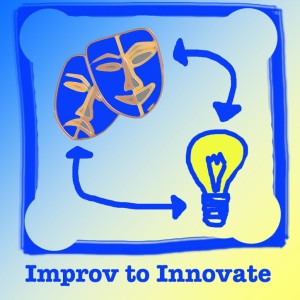 Improv is a Swiss Army Knife for Problem Solving
Improv is a Swiss Army Knife for Problem Solving
I just completed another workshop for high level executives in the use of Improv for Problem Solving. Most of the group were skeptical at the start. It shows up in their body language; arms folded across chests, quizzical looks, and self-conscious laughs. I get it. When I was in their shoes I would have resisted games too, I would have been afraid to act silly (or vulnerable).
Here’s the thing: the results aren’t silly. Improv games are a swiss army knife for solving complex problems. When you have a serious problem to solve, it’s time to “play” with the concepts involved. Improv is that vehicle.
Games Get You To Insights
Classic Improv games are adaptable for visioning, exploration, problem framing, idea generation, solution development, and planning. In short, for every aspect of problem solving (and incidentally, Innovation). The key benefit is simply getting to a breakthrough insight or idea much faster. It’s the play that does it.
In this week’s workshop the skeptics were won over in the first 20 minutes. I do an imaginative game where executives consult with, in their minds, the wisest mentor they’ve every known. I call it the Hero Tool. It’s a very reflective and visually rich experience — the kind of exploration they don’t normally do (at least not in a focused way). After the visioning, I have them talk about what occurred to them — but not as themselves, they speak as their hero, doing a role-playing monologue. It’s often dead serious, but wow, the insights.
It’s gratifying to see over half the group admit they had a significant perspective shift on a thorny business challenge — in 20 minutes! By the end of our time they’re eagerly jumping into “scene work” and jamming ideas and problem frames based on scene-stimuli. Light bulbs going off all over the place. There are laughs of course, but that’s incidental to the ideas being furiously written down in notebooks.
It’s Not About Comedy
You see, it’s not about comedy, using Improv in business. And it’s only partially about collaboration and team bonding. It’s more about listening. It’s about better access to spontaneous thought and free associative divergent thinking. More than anything else, it’s ultimately about perspective shift. Surprising the mind with stimulating, imaginative, and fun games can, and does, provide shifts in thinking that are elusive and time consuming otherwise.
Improv schools like Second City and IO Theater in Chicago lead executive or team workshops, and their focus is on team building. That’s great, but it’s a missed opportunity because the bigger pot of gold in problem solving applications.
It’s worth noting that Improv is “framework neutral.” What I mean is you could use Improv problem solving tools with Agile, Lean, Design Thinking, or CPS. All those frameworks have imaginative holes that Improv games fill.
People always say “get out of the box”. This is How!
As the world grows ever more digital, and technologies like AI or IoT dominate the headlines, let’s not forget that every trend has a counter-trend. As machines make more of the obvious combinations for us, it’s the human brain that goes to the unexpected places — that space where innovation lives. But that’s hard to do, you need new thinking tools to get there.
It’s this simple: if you want to think differently, about anything, work it into the context of a game. Adapting Improv games to complex problem solving, and innovation tasks, is like adding an accelerant to a smouldering fire. CEO’s and c-suite leaders need accelerant-tools to think differently, and faster. Improv games, adapted and focused, are the perfect way to do this.


